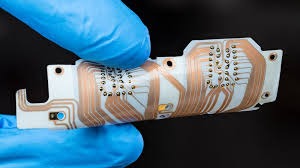As the electronics industry grows rapidly, the demand for higher performance, enhanced functionality, and smaller form factors drives advancements in Printed Circuit Board (PCB) technology. The selection of PCB base materials (substrates) plays a crucial role in determining performance capabilities. This article explores how high-performance PCBs are enabled by advanced material substrates, their key attributes, applications, and future trends in PCB material science.
The Evolving Landscape of PCB Materials
FR-4 (Flame Retardant 4) remains the standard material for conventional electronic devices. However, as modern electronics evolve toward more complex systems operating at higher frequencies and in demanding environments, FR-4’s limitations become evident. Advanced materials have emerged to meet the challenges of these modern systems.
High-Frequency Materials
PTFE-Based Composites
- Properties: Low dielectric constant, low loss tangent, excellent thermal stability
- Applications: RF and microwave circuits, 5G infrastructure, satellite communications
- Examples: Rogers RO4000 series, Taconic TLY
Hydrocarbon Ceramic Laminates
- Properties: Low dielectric constant, stable performance over a wide frequency range
- Applications: High-speed digital circuits, radar systems
- Examples: Rogers TMM series, Arlon CLTE-XT
Liquid Crystal Polymer (LCP)
- Properties: Low moisture absorption, low dielectric constant, excellent dimensional stability
- Applications: Millimeter-wave circuits, flexible high-frequency circuits
- Examples: Rogers ULTRALAM 3000 series
High-Temperature Materials
Polyimide
- Properties: High glass transition temperature (Tg), excellent chemical resistance
- Applications: Automotive, aerospace, industrial controls
- Examples: DuPont Kapton, Ube UPILEX
Cyanate Ester
- Properties: High Tg, low outgassing, excellent electrical stability
- Applications: Space applications, military systems
- Examples: Arlon 85NT, Nelco N4000-13 SI
High-Speed Digital Materials
Modified Epoxy Systems
- Properties: Improved thermal reliability, lower loss tangent compared to FR-4
- Applications: High-speed computing, telecommunications
- Examples: Isola IS400, Panasonic Megtron 6
PPE and PPO-Based Materials
- Properties: Low dielectric constant, excellent thermal stability
- Applications: High-layer count backplanes, high-speed servers
- Examples: Asahi Glass CCL-HL800, Nan Ya NP-175
Thermal Management Materials
Metal Core PCBs (MCPCBs)
- Properties: High thermal conductivity, CTE matching with components
- Applications: LED lighting, power electronics, automotive systems
- Materials: Aluminum, copper, or alloy cores with dielectric layers
Ceramic-Filled Composites
- Properties: Enhanced thermal conductivity, low CTE, good electrical properties
- Applications: Power modules, RF amplifiers
- Examples: Rogers RO-CT, Ventec VT-4B5
Flexible and Rigid-Flex Materials
Polyimide Flex
- Properties: Excellent flexibility, high temperature resistance
- Applications: Wearables, medical devices, aerospace
Liquid Crystal Polymer (LCP) Flex
- Properties: Low moisture absorption, excellent high-frequency performance
- Applications: 5G devices, high-speed flexible circuits
Emerging Materials and Future Trends
Graphene-Enhanced Substrates
- Properties: Exceptional thermal conductivity, high strength, potential for electrical improvements
- Applications: Ultra-high-speed circuits, advanced thermal management
Biodegradable and Sustainable Materials
- Examples: Cellulose-based substrates, bioplastics
- Challenges: Matching traditional materials’ performance and reliability
3D Printable PCB Materials
- Advantages: Rapid prototyping, complex 3D structures
- Materials: Conductive inks, nanoparticle-based materials
Challenges in Advanced PCB Materials
While advanced materials offer significant benefits, they also present challenges:
- Cost: High-performance materials are often expensive.
- Processability: Specialized handling and manufacturing processes are required.
- Availability: Supply chain issues may affect material availability.
- Design Complexity: Engineers must carefully integrate material properties into designs.
Selecting the Right Material
Choosing the appropriate material for high-performance PCBs involves considering multiple factors:
- Electrical Requirements: Frequency, loss, dielectric constant
- Thermal Management Needs: Heat dissipation and operating temperature
- Environmental Conditions: Humidity, chemical exposure, and operating temperature
- Mechanical Properties: Flexibility or rigidity
- Cost Constraints: Budget limitations
- Manufacturing Capabilities: Compatibility with production processes
Conclusion
PCB materials are evolving rapidly, driven by the increasing demands of modern electronics. High-performance PCBs benefit from innovations in material science, ranging from RF and millimeter-wave applications to advanced thermal management solutions. Future trends, such as graphene-based substrates, biodegradable materials, and 3D-printed PCBs, will continue to shape the industry.
Staying current with these material advancements is crucial for suppliers, engineers, and manufacturers to remain competitive. Whether through cutting-edge molecular technologies or clever designs leveraging advanced materials, the future of PCBs will hinge on the ability to push the boundaries of performance. As electronics evolve, advanced material science will play a pivotal role in unlocking new possibilities for the next generation of devices. Visit rushpcb.co.uk to find out how our full turnkey pcb solution can drive efficiency and performance in your electronics projects.
